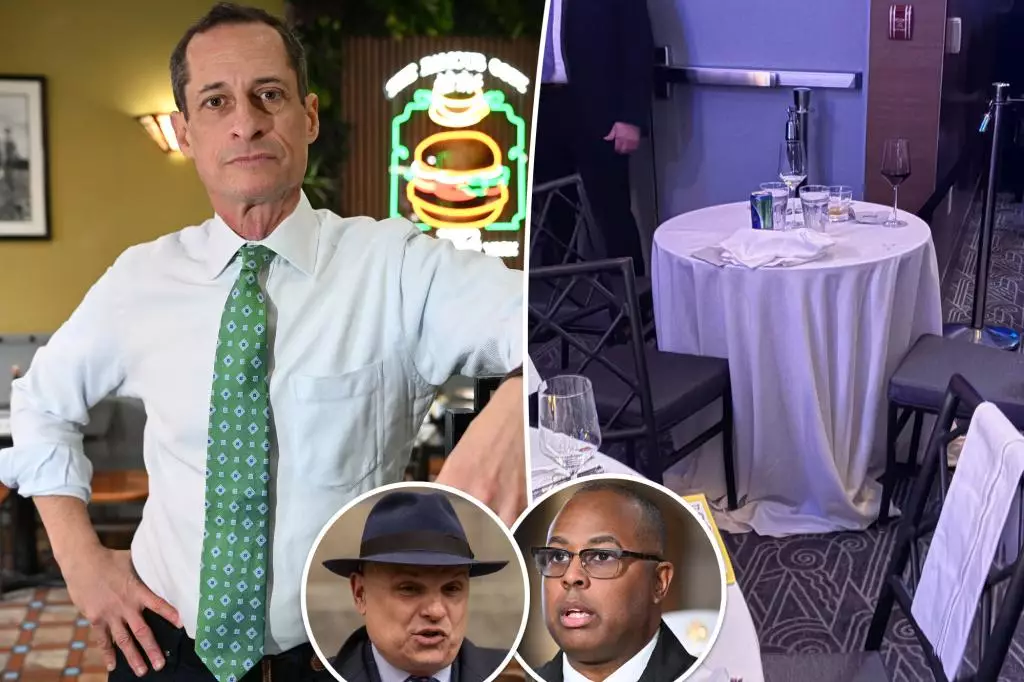The recent Inner Circle dinner at the Ziegfeld Ballroom in New York City highlighted a peculiar dynamic in the world of political galas—seating arrangements and the status they convey. Attendees of the prestigious 101st annual gala witnessed the infamous Anthony Weiner navigating an unflattering position, quite literally. Regarded as the political equivalent of a “kid’s table,” Weiner found himself sidelined in a smaller, less prestigious seating arrangement, igniting laughter and chatter among guests. This seemingly trivial incident underscores the complex interplay of reputation and respect within the political elite.
Weiner’s awkward placement at what insiders dubbed “the small Weiner table” has sparked discussion about how the powerful and the down-and-out are judged in social settings. The fact that a former congressman, who has faced severe public scrutiny, was relegated to a spot away from the spotlight speaks volumes about the political hierarchy. The message is clear: status matters, and in a room filled with influential figures, where you sit can speak louder than your words.
The Perception of Diminished Credibility
Reports claim that Weiner left the event shortly after being nudged away from a prominent table, later attempting to shrug off the demotion with a nonchalant explanation. “I never stay for the whole show,” he stated in an email, presenting an air of indifference that belies the truth—it stings to be put on display, even in jest. The swift departure, almost theatrical in nature, could easily be interpreted as an effort to sidestep further ridicule.
The narrative surrounding Weiner is a rich tapestry of political drama, made heavier by his past missteps. Allegations of impropriety, leading to his resignation and ostracism from the political sphere, amplified his stigma among powerful peers. The choice to seat him in a less favorable location symbolizes retribution for past controversies, a clear reminder that in politics, the past has a way of haunting one’s current endeavors.
Friendship Amidst Political Scandals
Arthur Aidala, Weiner’s long-time friend and defense attorney, was present at the gala and chose to publicly support him amid the jests. Aidala’s insistence that the table mix-up was an honest mistake reveals two significant aspects of their relationship. On one hand, it shows loyalty, a rare trait in the cutthroat world of politics; on the other, it hints at an underlying desperation to protect Weiner’s fledgling political ambitions.
With his noted history of representing high-profile clients such as Ghislaine Maxwell and Steve Bannon, Aidala’s credibility is established. However, it begs the question: how much can past friendships withstand the weight of transgressions? Aidala may find Weiner intriguing and charming, yet external judgment lingers, resonating through the whispers of attendees who viewed them as a relic of a time gone by.
Media and Political Melting Pot
The Inner Circle gala serves as more than a mere showcase of comedic talent; it encapsulates a vibrant intersection of political theatrics and media spectacle. This year, satirical performances targeting figures like Mayor Eric Adams and Governor Kathy Hochul instigated a dialogue about the state of New York politics and its colorful cast of characters. The evening was a reminder that, within these glamorous settings, reputations are shaped, tarnished, and sometimes rebuilt over the clink of glasses and shared laughter.
Among the luminaries in attendance were former mayor Bill de Blasio and other high-ranking officials, granting the evening a palpable energy. With humor as the primary vehicle, it’s easy to overlook the stark realities behind the laughter. Gaffes and missteps become fodder for jokes, yet they also resurrect the ghosts of political careers long thought to be laid to rest.
Weiner’s Comeback Trail
As Weiner gears up for another attempt at public office, his recent appearance at the Inner Circle brings mixed reactions. Many Democrats, including some close to Weiner, might feel uneasy about his return, questioning the feasibility of forgiveness in a highly scrutinized political landscape. His documented past raises eyebrows, ultimately questioning whether the New York public is ready to see him back in the fold.
Weiner’s struggle for redemption is a classical tale within the arts of persuasion and audience reception. The question remains whether charisma and charm can defy the odds in a political career rife with obstacles. As he navigates the murky waters of public opinion, the memories of his past actions lurk like a shadow, potentially dimming the brightest aspirations for his comeback.
Ultimately, the dinner at Ziegfeld Ballroom revealed how politics operates—a mingling of prestige, reputation, and the inevitable specter of missteps that continually shape an individual’s trajectory.
